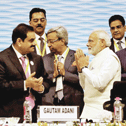MONOPOLY: In Modi Raj’s crony capitalism only a few industrialists like Gautam Adani and Mukesh Ambsani benefit.
Unlike during the liberalisation of the economy by Dr Manmohan Singh, when there was a level playing field, in the Modi Raj only close friends and associates have been benefited to create a monopoly to hike prices.
By Management Study Group
Free market capitalism works when there are no distortions in the working of the economy through “gaming and rigging the system” in favour of a few and at the expense of the many. Crony capitalism is one such form of distortion to the workings of the economy wherein well connected businesspersons use their proximity and connections to the banks and financial institutions and wangle loans and other favours.
Moreover, Crony Capitalism also works by filling the Board of Directors by what can be called “birds of the same feather” or those with like-minded interests who further the agendas of the promoters and in turn, gain some benefits in the process. In addition, Crony Capitalism also manifests itself when firms go bankrupt or “into the red” wherein the promoters and their cohorts in the regulators and the government come together to bailout the firms in times of need. Thus, Crony Capitalism works through mutual benefit and a nexus between the various stakeholders that result in distorting the system and creating a situation where a few benefit at the expense of many.
banks cheated
While Crony Capitalism is practiced the world over and with much finesse, in the Indian context, it is especially potent and all pervasive as can be seen from the numerous corporate scandals that have burst out into the open in recent months. Moreover, crony capitalism has been with us for decades, though, it has intensified in the build up to the Great Recession of 2008 wherein banks and financial institutions unleashed an orgy of cheap credit and lent to anyone and everyone who was willing to participate in the Debt Binge.
While the times were good, the loans and the debts ensured that the Indian Economy grew leaps and bounds until 2008 when the music stopped and the party ended leading to a gigantic crash the effects of which are being felt to this day. As the NPAs or the Non Performing Assets of the banks have now ballooned, it is time for reckoning as there are chances of another crash happening anytime now.
bending laws
This is the reason why the RBI or the Reserve Bank of India, in recent years, has been cracking hard on the crony capitalists to either pay back the loans or at least engage in a debt equity swap that would ensure that their firms do not go belly up. In addition, Crony Capitalism in India also works by creating an environment for the corporates to lobby the government into giving them favourable licensing agreements and pass laws and regulations that ensure their firms benefit in the process.
Moreover, the well-connected promoters also fill senior roles within their firms with employees, who share their interests and their agendas. Thereby, leading to a situation, where the entire hierarchy of the firm starting with the Board and including the senior and the middle management are their cronies.
In some cases, they also co-opt the auditors and the third party ratings agencies into their schemes. Thereby, ensuring that any financial malfeasance or otherwise unethical activity, has the blessings of the auditors and the rating agencies as well. Thus, all principles of free market capitalism are distorted in this way and this reflects in the price distortions and restricted lending to the poor and the needy and on the other hand, favourable lending to the rich and the powerful.
zee group loans
Indeed, as the points made so far indicate, Crony Capitalism cripples the economy when the good times end as the debts come due and the regulators crack down on the promoters. Having said that, it is inevitable that some form of Crony Capitalism happens everywhere and around the world. Indeed, without this, the economy would lose its momentum and the innovation and the risk taking subdued as everyone is cautious and unwilling to take big bets. Moreover, the “hidden hand of markets” ensures that sooner or later the economy moves back to equilibrium.
Thus, it is not the case that one must totally repudiate Crony Capitalism altogether. Instead, our argument is that it must not be pushed to the excess and all imbalances moderated from time to time. Indeed, the crash of 2008 should have been used to set things right and restore the balance and regain the momentum.
RICH GROW RICHER
Unfortunately, that was not the case and instead, we had the crony capitalists partying as never before and this is what should worry anyone who is concerned about the state of the Indian Economy. Thus, what this means is that we are in a situation where nobody follows the rules and where the entire system is paralysed. Thereby, crippling the workings of the various stakeholders. Ultimately, this results in losses to all and hence, it is time now for the periodic cleanup of the system.
Lastly, Crony Capitalism serves as the wrong role model to aspiring entrepreneurs and to management students, who see it as the only way, they can succeed. In addition, it creates a bad precedent for all and encourages such behaviour in all. As mentioned repeatedly, all this is fine when times are good and the music is playing. However, when the tide turns, it is anybody’s guess as to what happens next. To conclude, crony capitalism distorts the economy and has crippled the Indian Economy so much that the lay person is bearing the brunt.
Courtesy:
www.managementstudyguide.com
